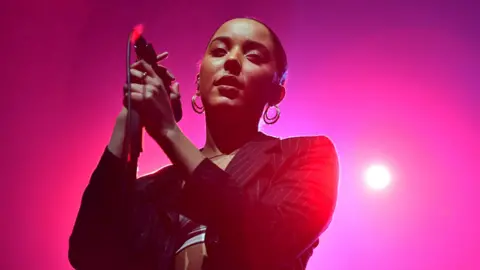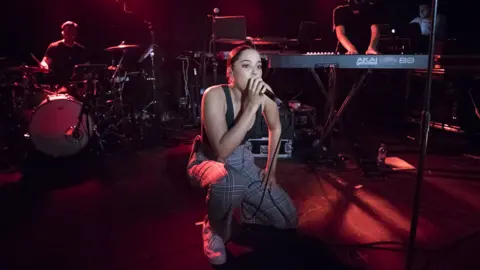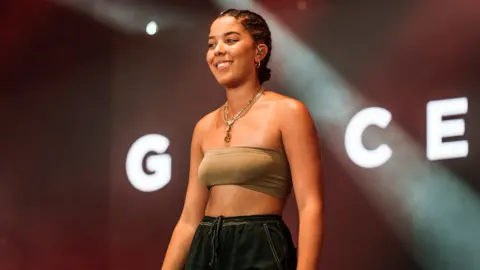BBC Sound of 2019: Grace Carter interview
The soul-searching songs of pop singer Grace Carter have marked her out as a rising star for 2019.
The Brighton-raised, London-based artist has come third on BBC Music's Sound of 2019, which is compiled using tips from critics, DJs and other music experts to showcase the best new talent for the new year.
Carter's reputation as a singer-songwriter overflowing with talent and emotion has been growing since (real) tears streaked down her face in the video for Silence in 2017.
Allow Google YouTube content?
Last autumn, she hooked more listeners with her single Why Her Not Me?, a poetic outpouring of pain, written on the day she discovered her father had been absent from her life because he was raising another family.
Her voice is sometimes accompanied by piano, sometimes by sparse yet stirring studio sounds. Her tunes are heartfelt and often heartbreaking, but also reveal an inner steel that shows that she, and we, can heal in the end.
"I never want to be a victim, and that's the main thing," she tells BBC News. "Of course there are sad subjects through all of my songs, but at the end of it I'm stronger than all of that."
She is now preparing her debut album after being signed by the same management company as Dua Lipa - who she has supported on tour - and record label Polydor, home to The 1975 and Ellie Goulding.

What were you like as a child?
I was a difficult child for sure. I was a very angry child and I hadn't quite found a way to let it out, apart from shouting, for a long time.
I grew up with a single mum and a lot of my anger came from that - not because I had a single mum, my mum was amazing, but because I didn't have half my family and I didn't understand why.
My mum met my stepdad when I was 13 and he was the person who really changed me as a child and the way I looked at my life and dealt with things. He got me a guitar and said, "Instead of shouting at everyone and getting really angry, why don't you just try and talk about the things that you're feeling?"
Was that a pivotal point in your life?
One hundred per cent. I thought I'd be angry for ever. My first song wasn't really about anything then, after that, when I started to delve deeper into emotions and situations and feelings, it definitely helped me forgive a lot of the things that had happened.
I don't think I'll ever forget, but I'll forgive. People make decisions for reasons that I will never understand, but I can process them and not have any resentment.
 Getty Images
Getty ImagesDid the words come easily? Have you always been good at writing?
To be honest, I was never good at school. I really struggled at school. My grandma would read poetry to me growing up, but I never really read as a child, which I kind of regret. But I just could never sit and concentrate for long enough. So I don't know where any of the lyrics came from. I was literally just talking about things I was feeling.
If I try and write a song about something I don't really feel anything about, it won't be a good song. Like, Why Her Not Me, for example - that was me literally walking into the studio with Mike Kintish, who I work with a lot, going, "Sadly, today I figured out the reason my dad wasn't in my life was because he was raising another family, but I want to know why he picked them over me. Why her not me?"
I literally just said that and the song wrote itself.
Allow Google YouTube content?
How long ago was that?
I was about 17, 18. This day… I'd always tried to understand why my dad wasn't in my life. I'd try as a kid to really understand and I never could.
And then this day I found family on Facebook and pieced everything together and it seemed he was raising another family and not me, and I sat down with Mike and the song just came about.
Are you glad you put that out there?
Am I glad? To be honest I'm just an open book. I didn't really think about it.
It was really hard - I think the month after I put Why Her Not Me out, I felt pretty exposed. I felt like I'd shared a lot.
But at the same time I felt like I'd got a lot back, and through sharing that story and being open, it allowed a lot of young people to be open as well. As hard as it was, it was also extremely empowering and exciting that I was encouraging young people to talk and be open about their feelings [about] situations they've been through, and help them realise that actually they're not the only ones who have felt it.
 Getty Images
Getty ImagesHow would your friends and family describe you?
Very emotional. Very loyal. I've been friends with all my friends since I was a baby.
What people are always quite surprised about when they meet me is, my music's quite sad - not sad, quite thoughtful, I guess - and I'm quite a happy person. People are like, "I didn't expect you to be so cheery". I can be happy because I'm processing the sad stuff.
You toured with Dua Lipa - what have you learned from her?
So much. Dua's become a friend and a really big supporter. I toured with her a year ago and it was the second tour I'd ever done. I think what she taught me was, if you're having a bad day and if you're struggling, just put a smile on your face and enjoy it as much as you can.
She's supported every song I've put out and it's nice to have someone who's a couple years ahead of you, who can give you advice and encourage you.
 Getty Images
Getty ImagesWhat do you like to do on tour?
I'm so boring! After I do every show, I like to meet everyone. So I'll come off stage, have a sip of water and I'll come out and meet everyone.
My music is very emotional anyway and people have really connected with it and given me a lot, and it's really nice that I can talk to people and see what their story is and hear them out. That's what they want from me and that's what I want to do as well.
And then I'll usually just flop. Sometimes it gets quite hard to sing about the things I'm singing about, so get I really tired. My band go for drinks and I'm like, "I'm gonna go to bed, see you later!"

Follow us on Facebook, on Twitter @BBCNewsEnts, or on Instagram at bbcnewsents. If you have a story suggestion email [email protected].
